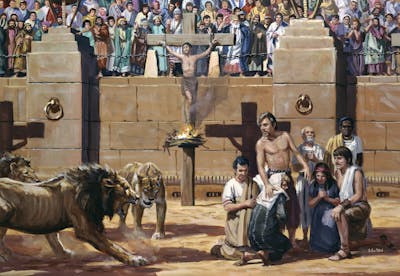Chapter 1 - A Work of Reform
Chapter 1 - A Work of Reform
A Work of Reform
God presented the Sabbath to humanity at creation as a gift. As sunset approached on the sixth day of creation week, Adam and Eve, glowing with joy over the abundance of what God had given them, settled into the first Sabbath humanity experienced. The Sabbath was a pause for peace. A slice of time carved out to experience fellowship with God and one another. A time to remember who we are, where we come from, and who we belong to. The Sabbath establishes our identity as sons and daughters of God. It secures humanity’s dignity as beings created in the image of God.
After the fall, Sabbath-keeping was treasured by the faithful. Cain would have had no occasion or inclination to acknowledge God’s sovereignty over his life, but Seth would have. Each successive generation of Seth’s family line preserved the beauty of the Sabbath. From Abraham to Isaac and Jacob to Joseph, until Egyptian bondage oppressed the Israelites, the Sabbath was a valued part of household life.
While in Egypt, Israel lost sight of the Sabbath until God called Moses to liberate them. When Moses arrived in Egypt, he re-established the Sabbath. Pharaoh protested this by adding to the people’s workload and accusing Moses of encouraging the people to rest or Sabbath instead of working as they were supposed to.
This pattern of Sabbath-keeping appears throughout the history of God’s people; the Sabbath given, lost sight of, and restored. When Israel was in the wilderness before they arrived at Mt. Sinai, God gave them an experiential exercise in Sabbath-keeping. In response to their complaints and demands for food, God rained bread from heaven. They were to gather only what they needed each day, trusting that God would supply more the following day. On the sixth day, they were to collect a double portion because God would not send manna on the Sabbath.
The Sabbath was a designated day of rest. It was a day for fellowship, community, and regeneration. When the Israelites arrived at Mt. Sinai, and God gave them his law they already understood how to put the Sabbath commandment into action. Unfortunately, after they were established in Canaan they lost sight of the beauty and significance of the Sabbath once more. Israel’s apostasy and backsliding paved the way for the Northern Kingdom of Israel to be assimilated by the Assyrian Empire and for the Southern Kingdom of Judah to be taken captive by the Babylonians.
Despite the exile, pockets of faithful Jews cherished the law of God. Like Daniel and his friends, these men and women were lights for God in their communities. However, as a nation, Israel had forgotten the commission God had given them; to be light bearers to the world. When the seventy years of exile ended, the Israelites who returned to Canaan re-established the temple services and set their minds to worshiping God. Ezra and Nehemiah’s reforms re-established Sabbath-keeping among God’s people, and miraculously Israel didn’t discard the Sabbath in favor of idolatry. They distorted it instead.
In the centuries between the return from exile and the first advent of Jesus, the Jews twisted Sabbath keeping into an unrecognizable and burdensome institution, stripped bare of its original purpose. Jesus reminded them of the true principle of Sabbath keeping in Mark 2:27; “and He said to them, “the Sabbath was made for man, and not man for the Sabbath”
Through his example, Jesus taught the Jews how to keep the Sabbath; he went to the synagogue, spent the day in fellowship with like-minded believers, and worked to do good. Jesus' sabbath-keeping was filled with communion, fellowship, and restorative labor upending the prevalent Jewish conception.
The Church kept the Sabbath after Jesus' death, but compromise crept in during the post-apostolic era. In an attempt to distance themselves from Jews and to curry favor with the Romans, many Christians began to keep Sunday as a day of rest. The church at large, however, didn’t assimilate this change until the conversion of Constantine to Christianity.
When Constantine adopted Christianity, he began to weave paganism into its fabric. A large part of this focussed on linking pagan festivals with Christian ideology. Constantine’s church minted all kinds of feasts for all kinds of reasons and, while they were swapping and creating special days, they took a stab at the Sabbath. In 321 A.D. Constantine officially mandated the change of the Sabbath from Saturday to Sunday.
Once more the church had lost sight of the true Sabbath though there were small pockets of Christians who resisted this change. Among them were the Celtic Christians of Iona and the Waldenses of the Italian alps. But a large-scale campaign to restore the Sabbath wasn’t undertaken until the commandment was re-discovered and highlighted by Sabbatarian Adventists in the 19th century.
Regardless of objection or opposition Sabbatarian Adventists, who later became Seventh-Day Adventists, championed the forgotten commandment. They understood not only its eschatological significance but its personal significance i as well. The restoration of the Sabbath is one of the many gifts Sabbatarian Adventism has bequeathed to Christianity.
Today millions of Adventists keep the Sabbath globally, not as a means to Salvation but as a grateful acknowledgement of God's sovereignty as our Creator and Redeemer. The Sabbath is a gift God gave humanity at creation. Not only does it promote physical well-being, but its impact on social, emotional, mental, and spiritual well-being is beyond estimate.
If you’ve never heard about this truth, why not explore it further? The Bible is the best place to start. If you already know about the Sabbath why not recommit yourself to embracing it and enjoying its beauty more fully?
Discussion Questions
1. What would the first Sabbath have been like for Adam and Eve? (See Genesis 2:1-3)
2. Why was the Sabbath lost sight of when Israel was in Egypt?
3. What pattern do we see throughout history regarding the Sabbath?
4. What role did Sabbatarian Adventists assume when they heard about the Sabbath?
5. Discuss ways a day of rest can enhance our overall health and wellbeing.

Next: Chapter 2 -Persecution In The First Centuries
Christians suffered terribly under Roman rule. They were regarded as a cult, which in and of itself was no unusual in the Roman world were cultic worship of various deities was the norm. What was unusual was the type of God they worshipped; a God of love, who was so self sacrificing that he had left the splendour of heaven to die for the ungrateful humans he had created. That narrative did not compute for many citizens of the Greco-Roman world. They thought Christians was strange fanatics. Added to that was their refusal to worship the cult of Caesar. This made them seditious fanatics. Enter an era of unprecedented persecution.


